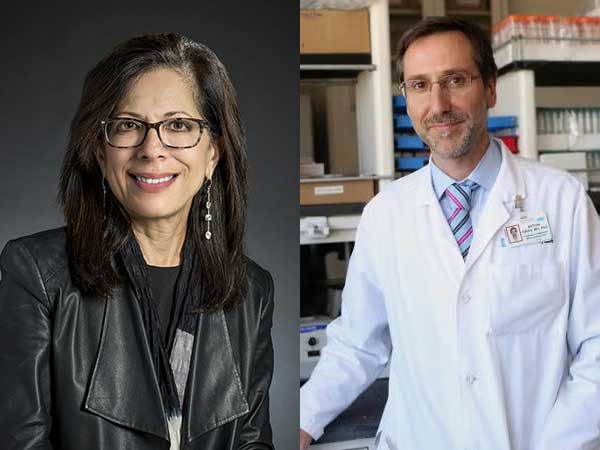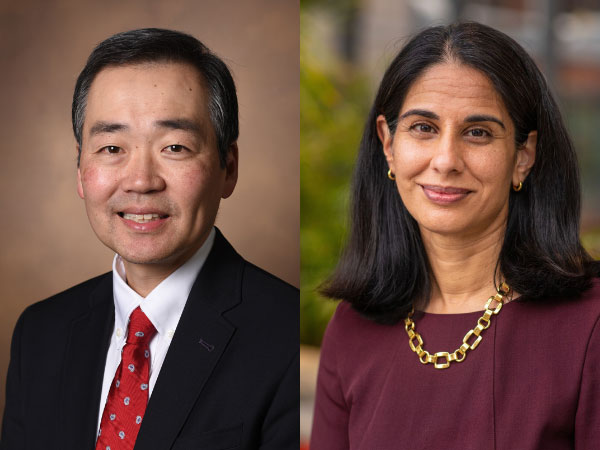Roy S. Herbst, Douglas R. Lowy, Yoshiyuki Majima, and Patricia Spears, received the AACR Distinguished Public Service Awards.
The awards recognize their groundbreaking, innovative work in the cancer research community that reflect a wide range of contributions. This year’s award recipients are honored for their work in clinical research, scientific leadership, and cancer policy and advocacy, respectively.


Roy S. Herbst received the 2020 AACR Distinguished Public Service Award in recognition of his sustained, outstanding leadership in cancer science policy for the AACR. This includes his stewardship as chair of the AACR Tobacco Products and Cancer Subcommittee, a position that he has held since the subcommittee’s inception in 2009.
Herbst is a member AACR’s Science Policy and Government Affairs Committee and its Regulatory Science and Policy Subcommittee, and represents the AACR in joint initiatives with FDA and NCI.
Herbst is Ensign Professor of Medicine, chief of Medical Oncology, and associate cancer center director for Translational Research at the Yale Cancer Center. Herbst’s research on the effects of tobacco has driven the Tobacco Products and Cancer Subcommittee to educate policymakers, scientists, physicians, and members of the public about the harms caused by tobacco products and addiction.
Herbst advocates for strong tobacco control policies and regulations and embodies the AACR’s goal to advance research to eliminate cancer incidence and mortality due to tobacco use. Herbst’s tobacco policy sessions at AACR Annual Meetings and participation in AACR congressional briefings play a crucial role in driving national tobacco policy changes.
Herbst was recently elected to serve as a member of the Board of Directors for the 2020-2023 term. He has served as chair (2016–2017) and vice chair (2012–2015), Science Policy and Government Affairs Committee; cochair, AACR-IASLC Joint Conference on Molecular Origins of Lung Cancer: Biology, Therapy, and Personalized Medicine (2012); senior editor, Clinical Cancer Research (2009–2015); and cochair, AACR Annual Meeting Program Committee (2008–2009).


Douglas R. Lowy received the 2020 AACR Distinguished Public Service Award in recognition of his leadership of the NCI during his tenure as the acting director. Lowy is the principal deputy director and chief of the Laboratory of Cellular Oncology within the Center for Cancer Research at the NCI.
As acting director of the NCI from April 2015 to October 2017, Lowy provided national leadership to advance the National Cancer Moonshot Initiative. He served a second term as acting NCI director from January 2019 to November 2019. In his current role as principal deputy director, Lowy continues to help lead the NCI’s key scientific initiatives.
Lowy is best known for helping to develop the technology underlying most human papillomavirus vaccines. For his work on HPV vaccines, Lowy and his collaborator John T. Schiller, received the Lasker-DeBakey Clinical Medical Research Award in 2017.
Lowy was elected as a Fellow of the AACR Academy in 2015. He received the Dorothy P. Landon-AACR Prize for Translational Cancer Research in 2009. He served on the AACR Research Grant Review Committee in 2009-2010.


Yoshiyuki Majima received the 2020 AACR Distinguished Public Service Award in recognition of his outstanding leadership in patient advocacy, education, and support through the Pancreatic Cancer Action Network Japan (PanCAN Japan).
Majima founded PanCAN Japan in 2006 after his sister’s death from pancreatic cancer. The organization has since grown to become the largest support organization for pancreatic cancer patients in Japan. Under Majima’s exceptional guidance, PanCAN Japan has set an ambitious mission to advance research, create clinical trial awareness, stimulate faster drug approvals, support patients, and offer hope to patients through service and advocacy.
One of Majima’s most notable achievements has been his effort to address the “drug lag” for first-line pancreatic cancer drugs imported to Japan. Under his leadership, more than 100,000 signatures were submitted to the Japanese Ministry of Health, Labor, and Welfare. As a direct result of this action, the ministry reduced the approval time for imported drugs from six years to two years.
In addition, Majima, a graduate of the AACR’s Scientist↔Survivor Program has been instrumental in launching and promoting a similar educational program in Japan, building bridges and unity among leaders of the scientific, survivor, and advocacy communities. The program has been so successful in Japan, it was presented at the Annual Meeting of the Japanese Cancer Association.
Patricia Spears, BS, will receive the 2020 AACR Distinguished Public Service Award in recognition of her longstanding advocacy for cancer patients and their loved ones and caregivers.
Spears has devoted her time and visionary leadership to more than a dozen initiatives, committees, and workshops with organizations such as the AACR, NCI, FDA, and others. These include the AACR Conflict of Interest Working Group, AACR Scientist↔Survivor Program, 2018-2019 AACR Annual Meeting Program Committee, the Translational Breast Cancer Research Consortium, the NCI Breast Cancer Steering Committee, Alliance for Clinical Trials in Oncology, NCI Core Correlative Science Committee, the FDA-AACR-ASTRO Clinical Development of Drug Radiotherapy Combinations Workshop, the FDA-ASCO Innovations in Breast Cancer Drug Development – Neoadjuvant Breast Cancer Workshop, the Patient-Centered Outcomes Research Institute, the Duke Cancer Institute cancer protocol committee, the ASCO Young Investigator Award Program, the University of North Carolina Lineberger Patient Research Advocacy Group, and the UNC Breast Cancer SPORE Advocates.
As a breast cancer survivor, Spears inspires clinicians and researchers by reminding them of the critical importance of the patient voice in treatment, communicating science and clinical research to the public, and facilitating the engagement of patients with basic and clinical researchers. Spears also urges patients to participate in clinical trials and has advocated for the incorporation of patient-reported outcomes into those trials.








